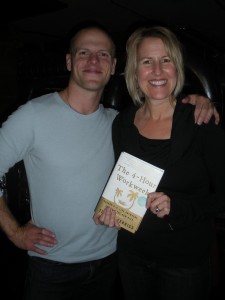Recently, I changed the way I look at, deal with, and dance with failure. When I left my corporate job of 20 years, I knew I wanted to teach other women how to succeed in the workplace. I had risen through the ranks in a growing professional services firm and was President and CEO for 7 years. I had done lots of ‘research’, I was ready to break out into coaching success.
The first training workshop I offered was Leadership For Professional Women, ages 25-30. I wanted to share the advice I wish I had when I was younger. You know, the kind of advice that would have saved a lot of wear and tear trying to figure out the rules of the workplace.
I ‘validated’ the idea with a handful of 23-28 year-old women. They told me I couldn’t offer the course on Monday, Wednesday or Thursday evenings because they work late on Mondays and the other two nights they are out on the town. I grew frustrated, partly by the process, mostly by breaking the rules of validation.
I advertised the course on Eventbrite, sent it to all my contacts, and posted it on Facebook and Twitter. Two weeks before the course date nobody had signed up. I gave discounts. Still nobody. I gave scholarships. Nobody. Finally I pulled the plug. I had a party and nobody came.
I was sick to my stomach and embarrassed. How could I be so good at growing a business yet fail so badly at filling a workshop? I didn’t want anybody to know that I had failed. I found myself asking “where is the nearest hole for me to climb in and hide?”
It happened again and I wrote the following in my journal:
“What did I just experience over the last hour? Fear, overwhelming fear. Fear that I would fail again and nobody would sign up for my workshop. Fear that I’m kidding myself that this business will work out. It feels like someone is sitting on my chest. I want the moment to end and get relief. Relief would come in the form of getting a new client or another person signing up for my workshop, something tangible that would signal I was moving in the right direction. My inner critic is screaming, ‘You’re taking way too long to market this event! Hurry!’ I want to see instant results.”
3 hours later I wrote—
“It feels like someone is poking me in the chest. I’m afraid of failing. I am attached to the outcomes of this event. Giving it up feels scary, like I’m giving up my child. I know it’s what I have to do in order to keep doing the next right thing. Stay detached. Release my attachments.”
Fearing failure is no way to live or make money. I decided it was time to change my relationship with failure.
Here’s the problem…
We all hate to fail and this impacts our ability to learn from failure. We think of failure as completely unacceptable because it may hurt our credibility and chances for advancement at work and in our personal lives. Most of us have experienced being incentivized by successes and punished for failures, reinforcing the behaviors of avoidance in acknowledging failures.
Example 1: Negative reinforcement for failure
“If you get good grades, I’ll give you money. If you get bad grades, you are grounded.”
Example 2: Self regulating to protect yourself.
I have a client who did this regularly. She would come up with an idea and try to make herself bulletproof by doing the following—
“I’m going to figure out the solution to this problem in my head (BTW – when you are in your head unsupervised and alone, you’re hanging out in a bad neighborhood!)”
“I’m going to work it out all ahead of time.”
Then, her inner critic says—
“Marketing isn’t going to go for it. The boss will probably laugh at you. I don’t think there are the resources. I can’t prove value ahead of time. NEVERMIND.”
So it becomes a non-starter.
Example 3: You limit yourself by using labels such as, “I’m being practical, realistic and responsible.”
These are all just mind blocks you use to avoid taking a chance. You might say, “If I take this risk, even though I think it’s probably the right thing and I can’t prove value ahead of time, I might fail. So I’m not going to do it. Besides, it’s not practical, realistic, or responsible.”
The avoidance of failure therefore becomes a barrier to going after your heart’s desire.
When you think about a record album—that’s how I used to play music in the old days—you have to do something drastic to get that needle to jump. This is what I call getting feedback.
What is Getting Feedback?
Getting Feedback is a process of transforming failure into success. I define Getting Feedback as gathering information on your path to achieving your heart’s desire.
Most people operate with the following mental model about success and failure:
We see ourselves in the middle, with success on one end and failure on the other. We do everything we can to move toward success and away from failure. But what if we reconfigured that model?
Instead of viewing failure as something to be avoided, turn it into a “stepping-stone” on the path to success and gratification. In other words, success is the destination. Failure is how you get there.

To achieve significant success in today’s world, failure is not just a possibility. It’s a requirement. We must see success and failure for what they truly are. They’re not opposites, but instead opposite sides of the same coin.
Now, change the word failure to FEEDBACK. Are you willing to go out and get FEEDBACK in order to succeed?

Remember, getting feedback is gathering information on your path to your heart’s desire.
How I changed my dance with failure.
I wanted to stop doing the same behavior over and over again and embrace something else that would work. Here’s what I learned and what I teach others. It works and it will work for you too!
- When an idea comes up, get curious and follow it.
- Think less and act more.
- Set a short time limit for doing it.
- Bookend your actions.
Example:
I left my corporate job after 20 years and immediately read Tim Ferriss’s book, The 4-Hour Workweek. I had read it a few years earlier and thought, “What a great idea, but not for me.” It was too scary at that time to think I could take the leap and start my own business and live differently from the ways I thought I should (authentically me).
I was also reading his blog posts and he posted a contest to participate with him in a 2-day live webcast at Creative Live, a company that brings inspiring experts together with the masses. His live webcast, called The 4-Hour Life—The Best of Body, Business and Mind, was based on his books—
- The Four-Hour Workweek
- The Four-Hour Chef
- The Four-Hour Body
He also has his own TV show on HLN. To be considered for 6 available slots you had to post a 60-second YouTube video of your three goals for the next year.
I knew when I read this that I had to do it within 24 hours or I would chicken out. I didn’t know anything about videotaping, YouTube, or Twitter (all required). I had to ask my teenage son for help. I said, “Would you video tape me, upload it to YouTube, set up a Twitter account for me and promise not to laugh at me.” I proceeded to cry. I felt like I was 12 years old, trying out for the school play or having a sibling tease me. Old stuff came pouring out.
He said yes he would do it without laughing at me. I immediately wrote my script, got on my outfit and recorded my video. My son did his magic and posted it.
I didn’t hear from Tim so I assumed I wasn’t selected. There were hundreds of entries so I figured they picked 6 other people. This is getting feedback.
Four days before the webcast I get a phone call on my land line (What’s a land line? Ask your grandmother!) I never answer that phone because I only receive marketing calls on it. The message machine goes off and I hear, “Hi, this is Creative Live and we’re looking for Moira Lethbridge.” I leaped out of my chair and answered it. They had tried to get hold of me via Twitter but I hadn’t responded because I had no clue how to use Twitter!
I was selected! I won the contest! There were so many entries that Tim doubled the participants from 6 to 12. I immediately booked my flight to the Creative Live Studio. I was the oldest person selected (at age 47). More feedback.
It was a turning point in my life. I was seen as me. Who I really am. No armor. No title. No pretending. Authentic. Because I listened to that voice that said, “Do it now!” I didn’t allow myself any time to talk myself out of it. I thought less and acted more. It works!

Tim Ferriss and me. There were 50,000 people watching us live!
Here’s the video! https://www.creativelive.com/courses/4-hour-life-tim-ferriss
Bookending is another powerful technique I teach and use when I have a challenging step to take in order to get feedback. It is committing to an action before and after you take it.
Here’s How:
- Identify two or three friends that will help you get feedback (gathering information on your path to your heart’s desire). I recommend not picking a significant other or siblings. They are not objective enough.
- Call, text, or email them the action you are going to take and the timeframe in which you will do it. I HIGHLY recommend within 24 hours. More time leads to sprouting feathers and backing out (cluck, cluck).
- Follow up with a call, text, or email that you did the action.
Email EXAMPLE:
Hi Moira,
I committing to asking 3 happy people what they do to be compassionate with themselves. By Saturday I would like to have done one in-person meeting and talked with two others on the phone by Sunday evening.
Text Sunday night: I did it! Awesome feedback ☺.
Now it’s your turn!
We’ve been convinced that failure is a negative thing and because of that, we have developed behaviors that help us stay far away from the possibility of failure. There isn’t any invention in this century that didn’t have a dozen if not hundreds or thousands of broken prototypes in order to gather feedback which lead to ultimate success. In life, we have to try despite the potential of failure. We have to reframe the way we look at failure to realize that it is part of the process for living and without failure, we don’t receive feedback that leads to success.
It’s time for you to learn from my slow dance with failure. Time for you to put your ideas into action without letting your inner critic take over. No one showed up to the first workshop I organized, but you know what, now I have full workshops. I have full workshops because that failure was part of the process—I learned lessons from it, and I adjusted my approach the next time.
It’s time to embrace failure—because it might just be the only way to incredible success.






